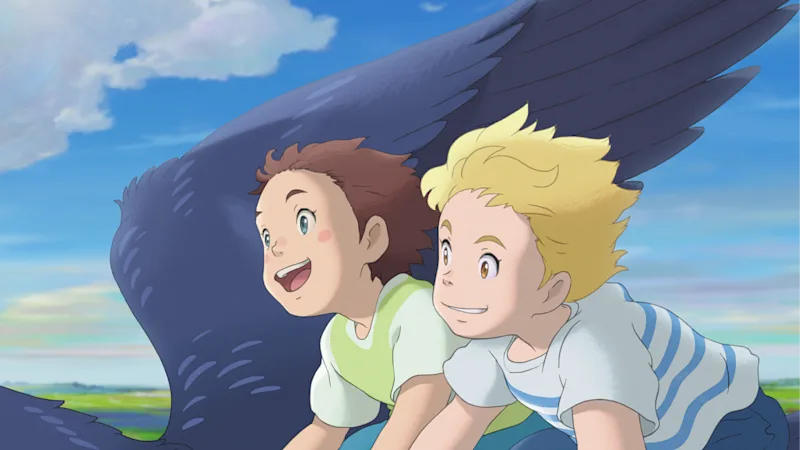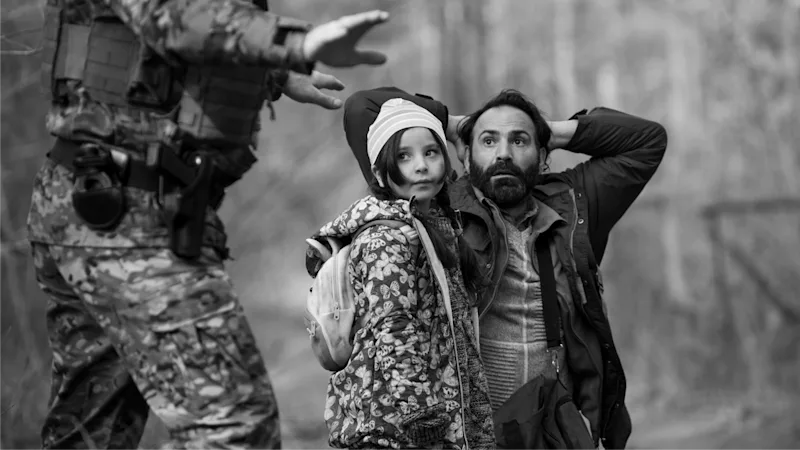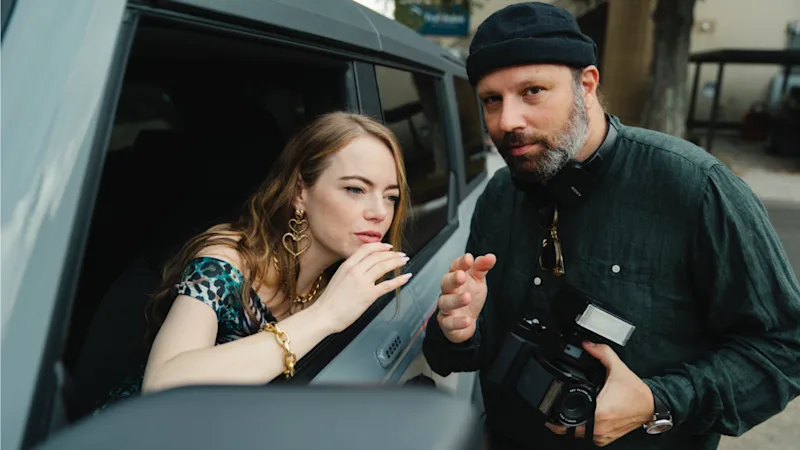The filmmaker Joe Brewster still remembers the first times he heard Nikki Giovanni's poetry. It was a summer day in South L.A. during the '70s, and Brewster had the radio tuned to KGLA. "And Nikki was on the radio." Between Top 40 hits from Stevie Wonder and Marvin Gaye, the poet and activist read one of her works.
"I was transfixed by what she was saying," Brewster recalls. "I'm a history buff and I was always thinking about my place in society, my place in L.A., and she told me that I had been around for a thousand years and that I could create and that I was important. And I never forgot that."
For Michèle Stephenson, his filmmaking partner and spouse, Giovanni's impact came later in life. In college, Stephenson sought out voices of the Black diaspora, exposing herself to Sonia Sanchez and Ntozake Shange and Giovanni. "They blew my mind," she says, "and gave me a sense of purpose."
A Harvard-trained psychiatrist and Columbia Law School graduate, respectively, Brewster and Stephenson began making documentaries together nearly 30 years ago. Their own body of work includes 2013's American Promise, which won the Sundance Film Festival's Special Jury Award, and now Going To Mars: The Nikki Giovanni Project.
The film takes its name from Giovanni's poem "Quilting the Black-Eyed Pea (We’re Going to Mars)," and her belief that, as she writes, "The trip to Mars can only be understood through Black Americans." Going to Mars unfolds as an impressionistic collage of archival footage, present-day interviews, and live poetry readings, traversing time and space to reveal Giovanni's vision of the future for Black women. As a matter of form, the documentary is as idiosyncratic and boundary-pushing as its subject.
Did it take convincing to get Nikki to agree to the film?
Joe Brewster: It did. She told us she never says no, but what we learned is that she did say no — which is typical Nikki. She says what she needs to at the moment. We thought that she just bought into it, but she told her partner, 'Nah, this is something you do for dead people.'
Michèle Stephenson: Her spouse pushed back and said, 'Let's give it a shot.' Nikki agreed after that. We had our first Zoom call, and then I remember I went down in September of 2015 and we kind of hit it off. They gave me a lot of champagne that weekend, and I was like, 'Okay! I can ride with them for a few years!' [Laughs] I think it was a mutual sort of seduction, and that also tipped the decision. And then it's been that way now for seven years.
Joe Brewster: When you're dealing with Nikki, there's three things you have to deal with: You have to deal with history; she's a f**king historian. It's an overwhelming experience. And she likes entertainment and champagne, so you always have to have a glass. But the third thing is she likes to cook, and after every shoot there is a spread. This spread could be a rack of lambs. One time she did chitlins. The food is amazing.
She was the subject and catering on this.
Brewster: Exactly! But that's how she lives her life. And it's more than southern hospitality. She brags about her cooking, and she'll tell you which author can't cook and which author can.
You start the film with Nikki saying, 'I don't remember a lot of things' and that she 'remembers what's important and makes up the rest.' For her, that's what storytelling is about. But one could argue that goes against the conceit of documentary filmmaking. Why was it important for you to not only include that, but engage with that at the onset?
Brewster: The beginnings of films are one of the most difficult things. We went through, what? A hundred iterations of the beginning, and there were a couple of things that we needed to do. We needed to prepare the audience for Nikki — because she's complex! She changes her mind sometimes. Sometimes she contradicts herself. Also, we had to prepare them for the universe we were about to experience. We found that we finally hit upon something which prepared the audience for what they were about to see. We were going on a ride, and this was the character we're dealing with, and this is how we're going to deal with it.
Stephenson: It's also leaning into what I believe to be a fact: That all storytelling, whether it's fiction or nonfiction, is manipulation. The question is, how do we engage with that? And how does that manipulation serve a higher truth? Which is what poets do — bend all kinds of reality to make you feel something that feels like a central human truth. For us, it was that question of introducing Nikki, but also understanding, what are we doing when we do this form, and how do we engage with it? How do we get to your emotional core? Sometimes, it does require manipulation and working through things.
The other thing, too, is it was a window into the fact that she is losing her memory and this is how she copes with it. There are all these different layers right from the beginning. It's loaded. I don't have a good memory, and what I don't remember, I make up the rest. And that's what storytelling is. In that making up, that's what we love about her, right? It's really delving into the mind of the poet.
As much access as you are granted into Nikki's life, at the same time, she has no qualms telling you that she's not going to answer a question. As filmmakers, what are you thinking and feeling in those moments?
Stephenson: I'm feeling terrorized when she says no! [Laughs] I was like, 'Uh-oh, I'm going to get a slap on the wrist.' It's intimidating, I'm not going to deny that. But we've been around the block a few times, and as producers and artists, we understand that when engaging with other human beings, that no is always an opportunity to open a door somewhere else. We just have to find that door. In some ways, the fact that she says no so clearly is really a good thing for us. Maybe this is the reason why we even included it. There's no passive aggressiveness about it. There's no sort of pretense. We understand what the exact parameters are and we can move forward. I appreciate that.
Brewster: We are like water. It's like, 'Okay, let's go another route.' We like to say that every emotion she's ever experienced is in a poem, and so a no means that we have to find another tool to tell this story. And the toolbox that we used was more expansive than any of our other films, because of her. We used everything but animation, and the only reason it's not there is because we pulled it, because it was too much. We use verité, we use VFX, we use poetry, we even use the music in a way that pushes story.
Stephenson: It also freed us up from being a traditional biopic, which was always our intention. It could really be a delve into the impact of poetry and what it does and what feeds this artist to express herself. We feel that Nikki deserved something where her voice was at the center, and that her work could be felt directly by the audience.

Talk to me about the process of creating the visual language of the film. How did you discover the way in which you were going to present this imagery alongside her poetry?
Brewster: Well, I want to start by saying we did have to discover this.
Stephenson: We had specific obstructions that we imposed on ourselves. One was that everything would be exclusively in Nikki's voice, and that we would have these different layers of experiences — one being the poetry itself, the archival, and then her own performances on stage and the verité moments that we captured. It was a question of, what is that visual conversation going to look like between these different layers? And that took a long time to develop.
Brewster: The first step was to fall back on our skill level, which is as interviewers and as verité filmmakers. We cut everything we could that was verité. And then we had to learn a more abstract visual language; we chose a more African American sensibility, where we wanted call and response. We wanted scenes where [James] Baldwin is saying something and she's saying something else in the verité or in the poetry. We used a lot of rhythmic cutting, but certain kinds of rhythmic cutting. It's a lot of polyrhythms. In fact, we would tell the editors, 'You have to feel the scene.' You almost had to dance as you watched it, so that you were moved on another level.
Stephenson: Nikki's own rendition of how she speaks, how she recites the poetry is rhythmic. So, there was a rhythm to that that we needed to play with visually. We were working with Terra Long, who is a more experimental filmmaker-editor, who allowed us to get a little bit more abstract while still understanding we needed an emotional core to these sequences. It was a conversation between what was being said and what was being shown. We really avoided literal illustrations. So, sometimes it would be contradictory, what we call antithesis versus thesis. Other times, it would come a little before what you heard. We were playing with that conversation between the archival, the poetry, the music, and the rhythm of the editing.
Brewster: The last six months of the edit, we were really focused on thesis-antithesis and the juxtaposition of scenes so that the combination of images would make you say, 'Oh, f**k!' They'd point you to somewhere else.
Stephenson: Depending on what scene you see before the poetry montage and what you see after, it all has a different cumulative effect. There is archival footage that is deeply researched that many people have never seen before. But there is also archival footage that is part of our collective consciousness, whether it's the Rosa Parks mugshot, or the shot with Emmett Till and his mom, and footage around the bombing in Birmingham. But we really wanted to twist how it was being seen, so that depending on where we put it, how we put it, how we integrated it, people would have a new reaction to something they had already seen before. Then it's what you know in your mind of that picture, plus how we've interpreted it for you, which gives, we hope, a new emotional resonance.
The sheer amount of material you had to work with, and then how you managed to layer it in a way that is intellectualized but flows seamlessly, that's pulling off a magic trick.
Brewster: Well, the magic trick is not having any money, so we had time to play with these images. Literally, when we stopped working with the verité editor, we had to wait eight months. We weren't going to wait. We were playing with images and we did some pretty magical things with that poem "Going to Mars." And Terra comes in and used it as a template.
Stephenson: These things take time. The magic you talk about, there's a lot of hard work behind it to make it seamless. It's an integrating and an understanding of the strengths of different editors we worked with. It's really a collaborative effort between us and editors with different skill sets that we were able to synthesize into this.

What was it like showing Nikki the film for the first time? How did she react?
Stephenson: It was very nerve-racking. We went to her house and screened it for her. The internet was terrible.
Brewster: The internet didn't work! It kept stopping and starting.
Stephenson: But she was there with a couple of her close friends and her spouse, and they were deeply moved. I think Ginny [Giovanna's partner, Virginia Fowler] especially felt that it captured something that was quite special, and you could feel the love in the film. So, they were happy.
Brewster: I'll tell you another story. Maybe I shouldn't. We came back from Sundance and she says, 'My phone is ringing off the hook from people telling me about this film, and I've told 'em I haven't seen it, because I can't remember it.' [Laughs] She asked for another link. But I think she's got it now, because I just saw her on television and she's a great spokesperson.
Hey, she remembers what she wants! She wanted a fresh viewing experience without the laggy internet.
Brewster: Exactly!
The film premiered at Sundance and won the Grand Jury Prize. Your mission has always been to push the boundaries of documentary filmmaking and disrupt this nonfiction space. What does it mean for you to be rewarded in this way for doing just that?
Brewster: It's an emotional thing to discuss, because we probably had that as a goal, but we never thought we would get here. We heard things from our peers like, 'You've changed the form.' And we are getting calls every day asking for our editor or our sound person, but that is not going to help them. They have to listen to this conversation that we're having. People talk about the Russian school of editing [or the Soviet montage theory], but it starts a thousand years before that in terms of the importance of storytelling and the importance of how to emotionally resonate and provoke. This editing methodology and the time that it takes to do it is what people have to move towards. And it's hard. We are trying to figure out how to repeat this in an environment where the streamers want you to produce this all in 12 months.
Stephenson: I'm deeply moved by the reaction. It's sort of beyond our wildest imagination, and we hope it inspires other artists to also experiment and push and also push back on those short [production timelines]. Not that you need seven years — we don't want that either! — but certainly with nonfiction storytelling, we come from a place of informing, sharing, and experimenting with the form, and we need to honor that.
Brewster: I also think something that people lose sight of is, we have a lot of experience but we are a product of a Brooklyn community of filmmakers who have supported us financially and emotionally for years. I remember with American Promise, it was an amazing film. I don't think we got the accolades we should have gotten, but the community came back to us and said, 'Keep doing what you're doing.' Do you remember that, Michèle?
Stephenson: Yes, absolutely. And if you're really interested in pushing the creative process, each film contributes to the change that happens in the next film. In some ways, Going to Mars is the cumulative impact of these years of experience, and confidence, and vision.
RELATED CONTENT:
'Joan Baez I Am A Noise': How Three Women Captured the Life and Legacy of an Icon (Exclusive)







